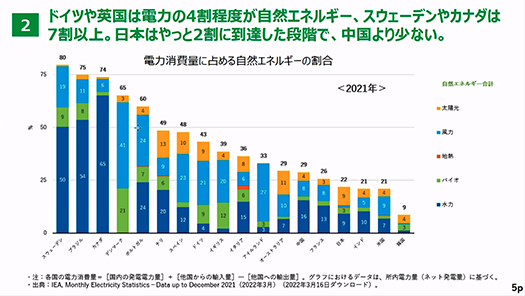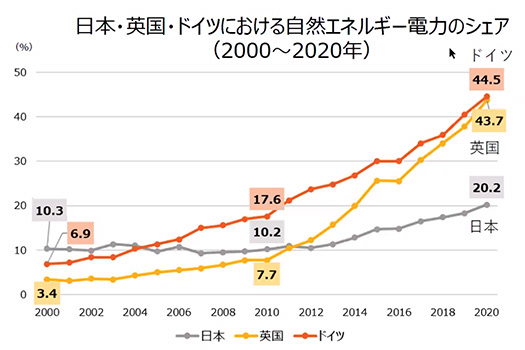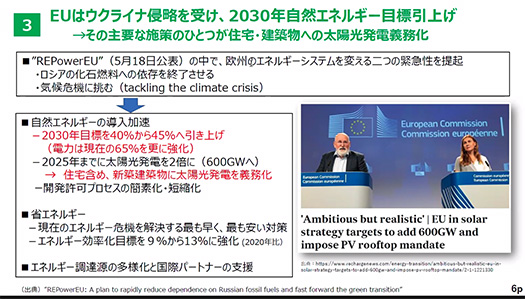


ウクライナへのロシア侵攻を受けてエネルギー安保論議が盛り上がっている。
なかでも太陽光発電について論議が喧しい。
どちらかというと北海道・寒冷地としては太陽光の冬場の問題があって
どのようにエネルギー選択をすべきか、という論点が主流なのですが、
温暖地域・東京都では住宅屋根面での太陽光発電「義務化」に踏み込んだことで
盛大な論争・論議が燃えさかっている。
その燃えさかっている論議の渦中に前真之東大准教授がいて
ながく誌面で「エネルギー論」を執筆いただいて来ていることから、
もっと落ち着いた議論をと、やや心配しながら推移を見ておりました。
昨日はその東京都の推進側としてWEBセミナーがあって
若干ハラハラしながら聴講参加しておりました。
わたし自身もこうしたエネルギー施策の論議に関わってもいるので
温暖地域での今回の情報開示からは有益な知見も得られた次第です。
セミナーの最後部分で「まとめ」があったので以下に。
1 住宅を建てる個人への「義務」付けではなく約50社の住宅企業への義務づけ。
➡いわんや既存住宅への義務づけではない。
2 住宅メーカーへの義務づけも全住宅への設置を求めるものではなく
設置に適した場所の住宅への設置で対応が可能なように制度設計。
3 太陽光発電を選択すれば、住む人の経済的メリットは大きい。
4 住宅入手時に太陽光発電設置費を調達できない人は初期費用ゼロモデルを選択可能。
5 太陽光パネルのリサイクル問題は国レベルの問題だが都は率先対応している。
6 「ウィグル問題」は看過できない重大な問題。
問題の本質は太陽光パネル生産の8割が中国独占であること。
➡脱炭素社会へ向けて世界の供給構造を変える必要がある。
■アメリカは「国防生産法」を発動し国内供給を強化開始。中国産輸入規制も。
■EUも域内での供給体制強化を打ち出している。
➡日本でも国の主導で対応方針を明確化すべき。
〜というような論議の整理が行われていました。
わたしとしては政治の側、パフォーマンス優先の都知事への潜在的不信感が
反対を主張される側のみなさんの強い反発を呼んでいると感じます。
エネルギー論議の前にそういったハレーションが大きすぎるのではないか。
そういう矢面にエネルギー論が立たされている不条理みたいな。
北海道では先日も書いたようにそもそも屋根面の冬期積雪による効率低下、
それをカバーする壁面設置などの「対応法」の論議の活性化、
さらに太陽光1本足ではない方向の探究などが必要ではないかと考えています。
上記の内、5−6のポイントについては住宅設備のエネルギー安全保障の
大前提に関わる事柄でもあるので、より注意を傾けていく必要があるでしょうね。
English version⬇
Spillover of Overheated Debate on Tokyo’s “PV Obligation”.
A Northern Perspective on the Overheated Debate. Energy discussions can easily become heated because they are also security discussions. That is why we should be aware of the need for cooler debate. …
The energy security debate is gaining momentum in the wake of the Russian invasion of Ukraine.
Among these, the debate is particularly contentious about solar power generation.
If anything, as a Hokkaido and cold climate region, there are winter problems with solar power.
The mainstream debate is about how we should make energy choices.
In the warmer regions of Tokyo, however, there has been a great deal of controversy and debate over the “mandate” of solar power generation on residential roofs.
In the warmer climate region of Tokyo, there has been a great deal of controversy and debate over the issue.
In the midst of this flaming debate, Masayuki Mae, an associate professor at the University of Tokyo, has been writing a long-running article in the magazine entitled “Energy Theory”.
He has been writing “Energy Theory” in our magazine for a long time.
I have been watching the debate with some concern, hoping for a calmer discussion.
Yesterday, there was a web seminar as a promoter of the Tokyo Metropolitan Government, which I attended with some apprehension.
I attended the seminar with some apprehension.
As I myself am involved in the discussion of energy policies, I found the disclosure of this information in the warmer regions to be informative.
I was able to gain some useful knowledge from the disclosure of information in the warmer regions.
The following is a summary of the last part of the seminar.
1. It is not an “obligation” to individuals who build houses, but to about 50 housing companies.
It is not an obligation to existing houses, so to speak.
2 Obligation to housing companies also does not require installation in all houses.
The system is designed in such a way that it is possible to respond by installing the system in homes in locations suitable for installation.
3 If photovoltaic power generation is chosen, the economic benefits to residents will be significant.
4 Those who cannot finance the cost of solar power installation at the time of acquiring the home can choose the zero initial cost model.
5 The recycling of solar panels is a national-level issue, but the Tokyo Metropolitan Government is taking the initiative to address it.
6 The “Uighur issue” is a serious problem that cannot be overlooked.
The essence of the problem is that 80% of solar panel production is monopolized by China.
➡The global supply structure needs to be changed toward a decarbonized society.
The U.S. has invoked the Defense Production Act and started strengthening domestic supply. Chinese import restrictions are also in place.
The EU is also strengthening its supply structure within the region.
Japan should also take the lead in clarifying its policy on how to respond to this issue.
〜The discussion was organized in such a way as follows.
I have a latent distrust of politics and the performance-driven governor of Tokyo.
I feel that the latent distrust of the governor of Tokyo, who is a performance-driven politician, is causing a strong backlash from those who are opposed to the project.
I think that this kind of haloing is too big before the energy debate.
It is like an absurdity that the energy debate is being put on the spotlight like that.
In Hokkaido, as I wrote the other day, there are many problems to be solved, such as the decrease in efficiency of roofs due to snow accumulation in winter and the installation of walls to cover it.
In Hokkaido, as I wrote the other day, there is a decline in efficiency due to snow accumulation on roof surfaces in the winter, and the discussion of “measures” such as installing solar panels on walls to cover the decline.
Furthermore, I believe that it is necessary to explore a direction other than a single leg of solar power.
Points 5-6 above are related to the basic premise of energy security for residential facilities.
5-6 of the above points are related to the basic premise of energy security for residential facilities, so it is necessary to pay more attention to them.
Posted on 6月 14th, 2022 by 三木 奎吾
Filed under: 住宅マーケティング, 住宅性能・設備, 状況・政治への発言







コメントを投稿
「※誹謗中傷や、悪意のある書き込み、営利目的などのコメントを防ぐために、投稿された全てのコメントは一時的に保留されますのでご了承ください。」
You must be logged in to post a comment.